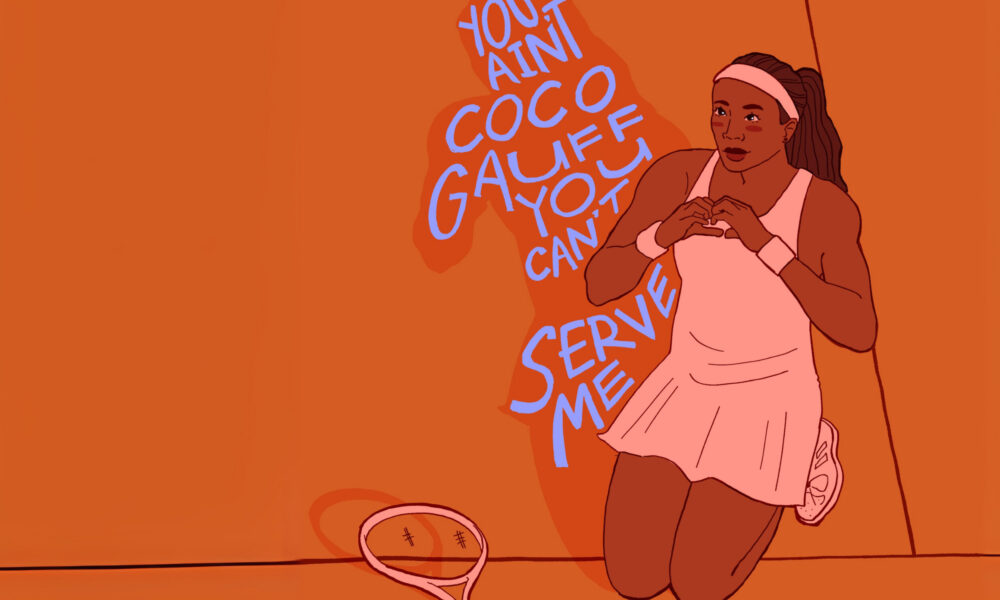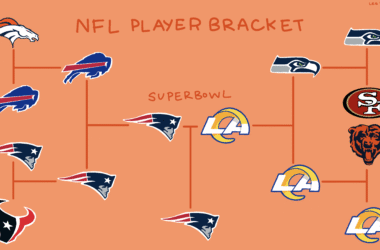On June 7, American tennis star Coco Gauff fell to the ground in pure emotion upon winning the 2025 Roland-Garros (French Open) final. The 21-year-old shone in the match’s second and third sets to beat renowned Belarusian player Aryna Sabalenka, currently ranked number one in the world by the Women’s Tennis Association, 6-7 (5), 6-2, 6-4. Gauff’s victory makes her the first American singles champion at the French Open since Serena Williams, who took home the trophy a decade prior.
After Gauff’s wonderful Roland-Garros performance, she immediately acknowledged Sabalenka’s strength as a player, and congratulated Sabalenka and her team, in her post-match speech. However, Sabalenka did not extend the same courtesy to her competitor, choosing to blame her definitive loss on the day’s windy conditions. Sabalenka also claimed in a post-tournament press conference that her 70 unforced errors throughout the game’s three sets meant she was able to “give those wins” to Gauff.
“It felt like a joke honestly, like someone from above was just staying there laughing and like, ‘Let’s see if you can handle this’ […] and I couldn’t today,” Sabalenka proclaimed, crying. “I think [Gauff] won the match not because she played incredible, just because I made all of those mistakes [….] She simply was better in these conditions than me.”
Sabalenka continued by speculating that, if she had not beat the 2022, 2023, and 2024 French Open champion Iga Świątek in the 2025 semifinal match, Świątek would have taken the title from Gauff in this year’s Roland-Garros final.
Rightly, viewers around the world criticized Sabalenka for being a sore loser. But for Sabalenka to frame the French Open final as her—and even Świątek’s—losses, rather than as Gauff’s win, goes beyond poor manners: It reflects a persistent desire in tennis to minimize and villainize Black women’s accomplishments. Black women’s tennis successes are frequently framed as a result of their ability to “intimidate” their opponents with their “extreme physicality,” or as the result of luck. Rather than admire or acknowledge the pure skill and determination Black women—just like all other professional athletes—bring to elite tennis, white players and the media reduce them to racist caricatures, commenting on their Blackness above all. And when Black women lose, their frustrations are demonized, while white runners-up go uncriticized for their tears and outbursts. Whether Black women in tennis are winning or losing, professional tennis culture clearly treats their excellence as on the line every time these athletes step on the court.
Unfortunately, this year’s French Open is not the only instance of Sabalenka making underhanded remarks towards Gauff’s success. When Gauff defeated Sabalenka—2-6, 6-3, 6-2—in the 2023 US Open final, Sabalenka attributed her loss to “overthinking” in the presence of a roaring American crowd who were eager to see Gauff take the win on home soil. In a press conference following the match, Sabalenka stated, “The good news is that it’s me against me. The bad [news] is that I’m still having these issues playing against myself [….] But it’s okay. I’ll work harder so next time, I’m not going to get even a little bit tired on court, and so I’ll be better.”
Sabalenka treating Gauff’s wins as dependent on her own focus and energy levels is clearly a pattern of attempting to undermine Gauff’s tactical, exciting, and world champion-worthy playing style. By repeatedly centering the outcome of a match on her personal abilities, Sabalenka has tried to erase Gauff’s success from the scoreboard, time and again.
When white opponents undermine Black winners in this way, they enable and condone racist tennis coverage that aims to further dehumanize Black women in the sport. Black women in tennis are frequently painted as inhumanely strong: In a 2013 Rolling Stone profile piece, a white journalist described Serena Williams as “‘built like one of those monster trucks that crushes Volkswagens at sports arenas.’” In 2014, the President of the Russian Tennis Federation, Shamil Tarpischev, called Williams and her sister Venus the “‘Williams brothers,’’ perpetuating the masculinization of Black women to devalue the sisters’ Grand Slam dominance of the time. And when not likening Black women to men, the media attempts to whitewash them, with one of player Naomi Osaka’s own sponsors depicting her with lighter skin in a 2019 advertisement. Women’s tennis coverage therefore either amplifies or conceals its athletes’ Blackness, treating them as exceptional for the completely wrong reasons.
In response to Sabalenka’s remarks that Świątek could have taken the French Open win, Gauff stated to the same press contingent, “I don’t agree with that [….] Last time I played, no shade to Iga or anything, but I played her and I won in straight sets. So, yeah, I don’t think that’s a fair thing to say [….] The way Aryna was playing the last few weeks, she was the favorite to win. So I think she was the best person I could have played in the final, her being number one in the world. So I think I got the hardest matchup.”
Gauff could have gotten more specific and pointed out that she, in fact, crushed Świątek—6-1, 6-1 in 64 minutes—in May’s Madrid Open. Gauff also could have declined the private and public apologies Sabalenka offered her after receiving widespread internet criticism for her conduct. But Gauff rose above, openly forgiving Sabalenka and repeatedly praising her tennis. The two athletes even made a lighthearted TikTok video together at Wimbledon on June 27.
“I’m gonna give [Sabalenka] the benefit of the doubt,” Gauff stated on Good Morning America, in one of many interviews where she was asked to respond to Sabalenka’s comments. “I’m sure it was just an emotional day, emotional match [for her].”
Gauff’s grace and class in response to Sabalenka are commendable. But it is disappointing that a major focus of Gauff’s post-win press has been Sabalenka’s actions, rather than Gauff’s successes. The onus has been placed on Gauff to handle Sabalenka’s outburst, and thus to justify and defend her own win. This skewed coverage diverts from public admiration of Gauff’s status as the highest-paid women athlete globally of 2024, or of her now-two Grand Slam titles, all earned by the age of 21. Rather than celebrate Gauff’s stardom, the press has tainted coverage of Gauff’s Roland-Garros win by instead giving attention to a player on her way to the unwanted list.
The professional tennis community and media circuit must start recognizing and celebrating Black women unconditionally, instead of doubting these athletes and trying to efface Black winners from their own wins. Gauff herself touched on doubt in her post-Open speech, referencing the Tyler, The Creator lyric, “I ain’t never had a doubt inside me, / and if I ever told you that I did I’m f*cking lying.” While she was referring to her own anxieties coming into Roland-Garros, Gauff’s words against doubt must be taken by the wider sports community as a call to challenge their racist invalidations of Black women on the court. Questioning Black excellence in women’s professional tennis constitutes a major lie: One which Gauff’s amazing style of play will continue to prove false in the years of her career to come.









